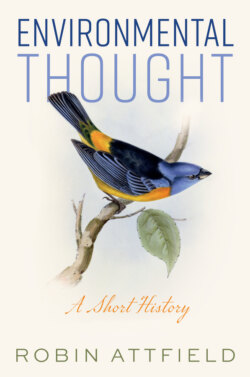Читать книгу Environmental Thought - Robin Attfield - Страница 13
Aristotle and Theophrastus
ОглавлениеAristotle (384–322 BCE) studied at Athens in Plato’s Academy, but set off in new directions, founding biology and spending long periods studying, together with his follower Theophrastus, the creatures of a lagoon on the island of Lesbos. He also founded the study of logic. Eventually he founded his own school, the Lyceum. In place of Plato’s theory of forms, for which the highest reality consisted in goodness itself and other such abstractions, Aristotle located reality in observable particulars (an approach much more congenial to most modern environmentalists).
For Aristotle, it is not only human beings who have souls, but other creatures as well; their ‘psyche’ is what makes them the living creatures that they are. One problem passage (in the Politics) claims that all other living creatures exist for the sake of humanity; but Aristotle’s usual view is that all living creatures have a good of their own, which should be respected where possible. Aristotle paid detailed attention to the study of animals in his books Generation of Animals, History of Animals and Parts of Animals, and found some animals to display virtues such as wisdom. (Some of his biological works were translated and studied by medieval Arabic scholars: see Egerton 2012: 20–1.) As he says in Parts of Animals in response to students reluctant to participate in such study, ‘[i]f there is anyone who thinks it is base to study animals, he should have the same thought about himself’ (Nussbaum 2006: 348).
Aristotle’s tenets that all kinds of living creatures shade into one another, and that all creatures can be ordered in a scale of comparative greatness, have been regarded by Arthur O. Lovejoy as contributions (in conjunction with others from Plato) to belief in ‘the great chain of being’, adhered to subsequently by the Neoplatonists and widely held across Europe until its rejection by the German Romantic writer von Schelling (Lovejoy 1936). But Aristotle actually rejected key components of this (later prevalent) ‘chain’, such as the principle that all possibilities are fulfilled. Nor probably did he adhere to the view that the implicit goal of everything is human benefit; animals aside, it is implausible that the sun and the stars have such a goal. Some of the Stoics may later have adhered to such an anthropocentric view; but their ideas should not be read back into Aristotle. Aristotle’s own views enjoyed a revival in Europe in the late Middle Ages, having earlier been cherished in such Islamic centres as
Baghdad and Córdoba. But by that time, being an Aristotelian usually meant deferring to his authority, and not, as in his own day, basing theories on empirical fieldwork. (For a more detailed account of Aristotle’s zoology, see Egerton 2012: 4–7.)
As for Theophrastus, who took over the leadership of the Lyceum after Aristotle’s death, he recognized that humanmade change (such as deforestation) can have impacts on the local climate. Theophrastus here departs from Aristotle’s view (expressed in the Meteorologica) that the world is permanent and ultimately unchanging. We find here the first glimmering of awareness of the systemic vulnerability of the natural world to human influence. But Theophrastus (despite his impact on Pliny the Elder) did not exercise sufficient influence for such awareness to prevail for over two thousand years; after the first century CE, his ideas seem to have been largely forgotten, despite translations during the sixteenth century (Egerton 2012: 33), at least until the time of von Humboldt (eighteenth century: see the above section on Hippocrates, and also Chapter 2).
